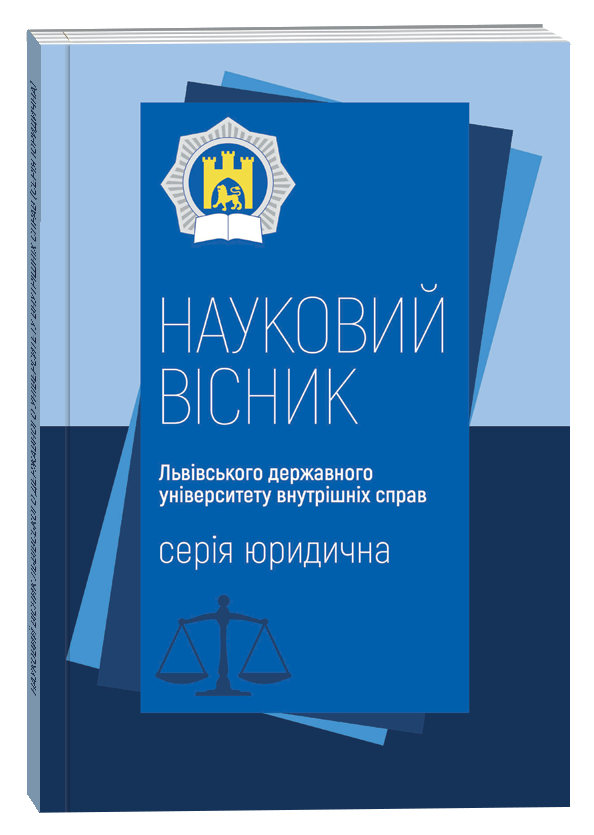IMPLEMENTATION OF ADMINISTRATIVE PROCEEDINGS BASED ON A DIGITAL PLATFORM
DOI:
https://doi.org/10.32782/2311-8040/2024-2-6Keywords:
justice, functions, access to court, administrative proceedings, administration, authentification, imperative and functional requirementsAbstract
The article, using a complex system analysis of legal regulation of the use of information technologies, deals with the implementation of administrative proceedings based on a digital platform. The creation of judicial digital platforms is a new factor affecting the features and forms of the organization of judicial activity. The introduction of judicial digital platforms as organizational-functional and technological phenomena leads to the transformation of traditional models of the organization of judicial activity. It leads to the transformation of many judicial institutions, such as the judicial system, access to court, jurisdiction and others. Changing social and technological factors in the functioning of courts raise an urgent need to develop a holistic approach to the organization of judicial activity as an integral concept that includes institutional and functional components. From an institutional approach to analyzing the organization of judicial activity based on a digital platform under modern conditions, the idea of a judicial system built as a digital technological platform accessible to individuals must be argued. Within the functional approach to organizing judicial activity based on a digital platform, the theoretical development of such concepts as the organization of judicial activity and judicial administration is essential. It makes it possible to determine the types of activities included in the phenomenon under analysis and their distinguishing features. Identifying the features of the institutional model of the organization of judicial activity as platform and multi-level, the study of which will allow building a unified process of development of courts and judicial activity for the near future, is gaining relevance. The importance of considering judicial digital platforms not as an isolated response to modern problems but in the context of the structure of the judicial system leads to the need for a theoretical justification of its platform characteristics as necessary guarantees of the unity of the judicial system in the remote implementation of organizational and procedural rights by interested persons. In addition, it requires a theoretical study of the nature of judicial digital platforms.
References
Директива ЄС (ЄС) 2019/790 від 17 квітня 2019 року про авторське право і суміжні права на Єдиному цифровому ринку та про внесення змін до директив 96/9/ЄС та 2001/29/ЄС. URL. https://zakon.rada.gov.ua/laws/show/984_022-19#Text.
Про надання уніфікованих рекомендацій для судів усіх інстанцій та юрисдикцій щодо безпечної роботи в умовах карантину: Рішення Вищої ради правосуддя від 01.04.2021 р. № 763/0/15-21. URL. https://zakon.rada.gov.ua/rada/show/v0763910-21#Text.
Про затвердження Положення про порядок функціонування окремих підсистем Єдиної судової інформаційно-телекомунікаційної системи: Рішення Вищої ради правосуддя від 17.08.2021 р. № 1845/0/15-21. URL. https://zakon.rada.gov.ua/rada/show/v1845910-21#Text.
Рішення Ради суддів України від 11.06.2021 р. № 18. URL. https://zakon.rada.gov.ua/rada/show/vr018414-21#n2.
Кобенко О. Майбутнє онлайн-судів в Україні: оцифровування наявних процесів чи цифрова трансформація правосуддя? Юридична газета оnline. 17.03.2023. № 1–2 (759–760).
Комітет цифрової трансформації інформує про сервіси на основі відкритих даних, які допомагають будувати прозору та демократичну країну. URL. https://www.rada.gov.ua/news/news_kom/236554.html.
Про внесення змін до деяких законодавчих актів України щодо забезпечення поетапного впровадження Єдиної судової інформаційно-телекомунікаційної системи: Закон України від 27.04.2021 р. № 1416-ІХ. URL. https://zakon.rada.gov.ua/laws/show/1416-20#Text.









